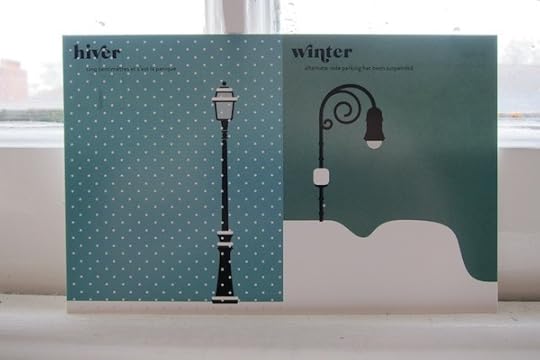Jessica Pan's Blog: Graduates in Wonderland, page 10
February 6, 2014
Beauty Marks
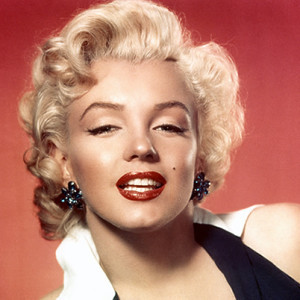
Photo from Biography
Some beauty trends make total sense. Platinum blonde movie-star hair? It’s flashy, shiny and fun! Plus, it’s a biological signal of youth (and men flock towards it). False eyelashes, as I explained earlier? They make your eyes look bigger (another sign of youth) and more dramatic.
A beauty mark, though? Why? Two words: Marilyn Monroe. But we’ll get to that in a minute.
Beauty marks have been associated with aristocratic women for centuries – even back in Ancient Greece, a mole on your cheek supposedly foretold great wealth. In medieval times, however, moles were considered a sign of demonic possession.
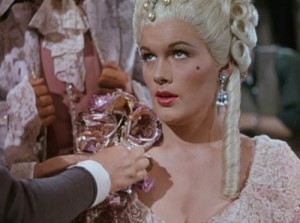
Photo by Weirdland
But only a few centuries later, fake beauty marks were used to cover up smallpox scars and other unsightly blemishes. Instead of concealer, women glued a variety of shapes and fabrics to their faces, from stars to hearts, from silk to velvet. These patches had the sexy name of “mouches,” French for “flies.” Oh, and did I mention their placement? The cheeks were popular, but it was also very sexy to have a beauty mark in your cleavage, like a magic-eye trick to attract the eyes to hard-to-notice breasts.
1952′s wildly popular Singin’ in the Rain had Lina Lamont, the great star with a star placed delicately on her cheek (see above). By then, of course, one of Hollywood’s most famous marked stars had already come crashing onto the screen: Marilyn Monroe.
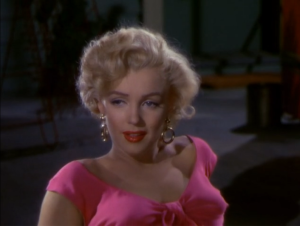
Photo by AltScreen
In her earliest films, you don’t really see Marilyn’s beauty mark (left). It’s hidden under powder and foundation, but, as she became more and more popular, so did her mole. It became more prominently featured in her close-ups, finally being immortalized in Andy Warhol’s Marilyn paintings. Norma Jean wasn’t just another starlet: she was the girl with the beauty mark.
And even recently in 2011’s The Artist, an actress (played by Berenice Bejo) rises to fame only after she is given a fake beauty mark to distinguish her from other actresses vying for a shot at the silver screen.
Not all moles are created equal, though. This trend gradually faded away until one supermodel with a prominent beauty mark became a household name and face. When Cindy Crawford appeared on the scene, the mole that Cindy was teased for as a child became a mainstream symbol for the star. Perhaps without the mole, she’d just be another pretty face with nice skin and hair in a clothing catalog. Although, lest we forget, moles can sometimes indicate skin cancer (Cindy claims she fears hers might turn cancerous).
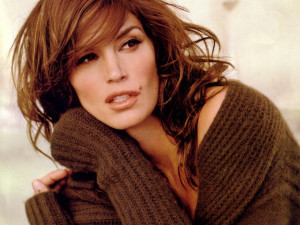
Photo from MSN
Today, actresses such as Blake Lively and Eva Mendez celebrate theirs by showing them off to the camera, rather than hiding them. Natalie Portman has several moles on her face, but only one takes center stage in her Dior ads.
General consensus is that beauty marks near the mouth ramp up a person’s sex appeal. The location of the beauty mark is also a secret glimpse into the soul. Beauty marks on the right cheek indicate a serious and academic personality (Natalie Portman did go to Harvard. And Blake Lively does seem grounded). A mole on the chin means the person is addicted to love and sensuality (Hello, star of Sex and the City, Sarah Jessica Parker! Although where is hers now?) And a mole close to the hair on the forehead indicates a person who loves to play games. However, most likely, it just means you have a mole close to the hair on your forehead.
If you were born with a naked, beauty-spot-free face, add one with black eyeliner, or – for the really committed –a Sharpie.
Just keep ‘em above the neck, ladies.
This is part of the weekly series of Rachel’s Old Hollywood Beauty Tips, peripherally based on her UK thesis work so she can justify writing them during the day.
February 4, 2014
How I Landed My Two Dream Jobs
This is the second in an ongoing series in which we interview people who have interesting jobs and get them to tell us how they landed them. They will also reveal how they handled the transition to the real world after graduation —
 Sometimes to find out what you really want to do with your life and where you really want to be, you have to crawl. You have to go work hard, sometimes at jobs that aren’t so great. You have to slog through a lot to get recognized. For some, the crawling, struggling, very hard way is the only way to get to where you want to be.
Sometimes to find out what you really want to do with your life and where you really want to be, you have to crawl. You have to go work hard, sometimes at jobs that aren’t so great. You have to slog through a lot to get recognized. For some, the crawling, struggling, very hard way is the only way to get to where you want to be.
My friend Imogen found her personal dream job twice this way. Her advice in a nutshell: you have to hit rock bottom to really challenge yourself and find a job meaningful to you.
Her post-grad tale takes her from Melbourne to Beijing and back again. We worked together as editors at the same magazine in Beijing, an experience that truly bonded us and to this day, she’s still one of my best friends even though she lives in Australia and I live in England and only get to see her, on average, every three years. (This is a long read, but so worth it if you’re looking for inspiration or motivation.)
In this piece, she goes from “I hated China every day all day. I hated it so much” to proclaiming four years later, “I loved Beijing. I loved my friends. I loved the food. I loved living there. I had absolutely no desire to leave it.”
When you were younger, what did you want to be when you grew up?
I actually wanted to be a writer because it was something I enjoyed and teachers at school told me I was good at. I knew I could never do a job that required math skills. And I think every girl goes through that photographer phase when they are really grasping at straws.
What did you study at university?
My whole university experience was messed up because I was one of those really snooty overachieving high school kids that was like, “Everything is going to fall into my lap because I am amazing and I deserve it” – that weird Gen Y thing. But I didn’t get into my dream school, RMIT, and the only other university in Melbourne that offered my degree and would accept my score was La Trobe.
I was really crushed. My whole identity was shaken. I was seriously a horrible person during university. I didn’t want to be at La Trobe, so I deliberately made zero friends. None. The classes were fine, but I…I was awful.
You studied Media and Communications at La Trobe? What did you think you would do after you graduated?
At this point, my boyfriend Qiao and I were 17 and living together in a share house. I mean, even the living room was rented out. Qiao, was in film school and we only hung out with film people, so I thought I wanted to be a film producer. When you have no idea what to do, you attach yourself to someone who kind of knows what they’re doing. I didn’t realize that a big chunk of being a film producer is actually bringing in the money and selling the film. When I realized this, I was like, “Oh wait, I don’t want to do that.”
What happened after you graduated?
I still had no idea what I want to do with my life. I was working part-time in a shop. Qiao finished his course before me and he had an offer to go work on a feature film in China. When he came back after four months, he was like, “You know, I made some friends in China and they say there’s film work in Beijing.” He said, “You want to work in film, too” (which I didn’t, really) but I said, “Fine, let’s do it.”
I cannot emphasize how much I didn’t know what I was going to do. I’d finished high school, finished university and then I looked at all the options and felt this huge pressure that if I picked one thing, that’s the one thing for the rest of my life.
Going to China was a way of avoiding having to make a decision. There was no point in my staying in Melbourne if I had nothing to do.
Did you have culture shock when you first arrived?
It hadn’t sunk in what a big move this was. In my mind, I was like, “I’ll just pack a bag and let’s go to China and let’s see what happens!” I didn’t realize the logistics of it or what it means to be away from your family. Qiao speaks Mandarin but I did not speak a word of it. When we first arrived, we stayed with a Chinese family friend who lives on the very outskirts of Beijing.
How were you feeling?
I went directly into a very deep depression. I didn’t have the motivation to learn Mandarin because I was just so embarrassed when I tried to speak it. I was the only white person in that district. People would just stop and stare at me. They’d follow me around the supermarket.
We lived so far away from all the other expats. It took almost two hours to get into the city. I was doing nothing. I was literally sleeping on someone’s couch.
I hated China so much. I hated being there. I did nothing all day and was scared of going out. Finally, the woman we were staying with offered me a position when somebody in her company went on maternity leave. She worked for a Chinese marketing education company. I now realize that she probably called Qiao’s mum and said, “She hasn’t gotten off the couch” and his mum was like, “Can you just find her something? Anything?” And so I started working in marketing at the Chinese education company three weeks after landing in Beijing. My first real job ever.
What did you do there?
A lot of trying to look busy do I wouldn’t get fired. Sometimes they would just ask me to sit in on a meeting because I was white and they thought it might impress their clients. I’d be sitting in 3-hour long meetings, all of it in Mandarin, and I had to pretend to take notes. I understood nothing. I also designed some of their logos because I did some design in high school. They were awful and they are still on the website.
I had never worked in an office before so I thought maybe it was this bad in every office. I didn’t get that there are good office jobs and bad ones. I was like, “How does everybody do this every day and not cry every night?”
I was convinced you have to stay at a job for a year before put on your CV. I still believe that. So I hated my job, which wasn’t really a job, and I had no friends. At this stage we had we had our own place but no hot water. That’s all we could afford.
This sounds completely miserable.
It took me 10 months to not hate Beijing. But before that point, I hated it all the time everyday. And I had to pretend like I was liking it even though I hated being there so much. But eventually, we learned how to get around. We learned where to go to meet other expats. We found fun places to go to. But I still cried every night because I didn’t want to go to work the next day.
And after I’d been at that job for one year, I was like, “Fucking yes! I can quit now!”
But then, I was still back in a position where I still don’t know what to do. I thought I had wasted a year of my life in a job I hated in a country I didn’t understand.
I decided I wanted to study Chinese so I could finally learn something. Qiao was working more so I could afford to do this. I mean, this was full-time Chinese language school at UIBE.
I started applying for other things as well. I don’t even think it was a conscious decision to forward my career. It was like, “Let’s just add a few strings to the bow.” And I began applying for internships so that I could also still do my language course.
I still liked writing. I knew about The Beijinger magazine and I thought I’d apply. I don’t even know if they were advertising. I just emailed a cover letter and CV and was like “Hey, don’t you want me?”
When I interviewed at the magazine, I told them I could only do 2-3 days a week, but they wanted 5. I was still studying part-time so I’d go to Chinese class in the mornings, come to do the internship, then go home and do Chinese homework for four hours.
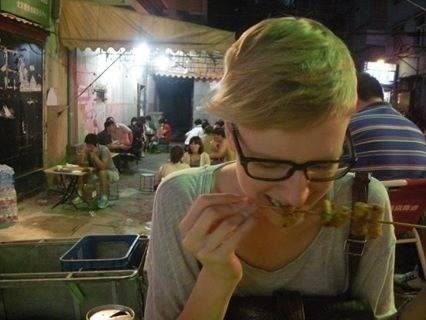
Imogen eating delicious street food during her “happy Beijing” phase
We first crossed paths in that office, but you were working for the other magazine first. How did we end up working together?
It was not fun at the beginning. Once again, there was nothing for me to do! Sometimes I had to stressful things like call up every Chinese business in the directory to update their details. But there really wasn’t a lot to do, so it was just as stressful as the marketing job.
I saw you editors and thought, “They’re never going to let me be one of them. All these people are too cool.”
Finally I told the main editor that I had nothing to do and she told me that your magazine needed people to write blogs. And I was like, “I’ll do it!” I gotta get something out of this. This life cannot be this shit for this long. So I threw myself into those blogs. And I was artificially absorbed into your magazine’s team.
When you started interning for us, I had no idea you were so miserable.
I think I made a point to hide it. I just felt like I didn’t know as much Mandarin as everyone or that I wasn’t as experienced. And everyone in that office was like, cool and British. Lisa had a nose ring.
But when I started to work with you and Michelle, I became really happy. I had a place to be everyday: school and then the magazine, where I was given a lot of things to do. I still wasn’t being paid as an intern, though. I thought, “I’m going to stay here until they give me a job.” I had nowhere else to go. I knew I could write.
When you miserable for so long, why didn’t you just move back to Australia? Did you ever think “I’ll just go home”?
Never. It never even crossed my mind. I hated it, but I thought, “Well, we’re here now.” When I first arrived, no matter how shitty it was, at least in China you could always do something different or weird. You see so many strange things and meet such different people. You’re so out of your element. It doesn’t matter what your degree is. It doesn’t matter that you don’t have running hot water. It’s okay because you’re in China. But if I was in Melbourne, you have to have a good job and a car and hot water. You have to have those things to fit into society.
In China, everything was such a mind fuck. It was almost like the badness was part of China. I had no idea that living in China could be good.
As an intern at your magazine, life was 60% fun and 40% bad. We still lived in an area really far outside the city but I was liking Beijing more. Qiao was earning a little bit of money. I was crawling out of the hole.
And then what happened?
You hired me as your deputy editor. And I finally got a good job where I was getting paid!
Yes! I interviewed five people but none of them were as good as you. You were always so enthusiastic and hardworking, but also, you had opinions. You weren’t wishy-washy. You had ideas.
I’ve always been opinionated and I felt like I’d learned a lot during that internship. When I got the deputy editor job, I could finally settle into China. This is my first real job where I knew what I was doing. I had a boss. It was a bajillion times better than the job I had before.
That was such a crazy time in both our lives, because I had just been promoted to Managing Editor and you were my Deputy Editor and we were both sort of stressed and trying to figure things out. We were so relieved when our first issue went to print.
And I enforced my bonding ritual on you: I took you to Luga’s and made you get drunk on margaritas. It was entirely deliberate on my part. I was like, “Let’s get drunk with my boss and break down the wall. Let’s do this and do it right.”
So we worked together for about a year like that and then I quit and moved to Melbourne (strange coincidence that I headed to your hometown). Then you took over MY job? How did you end up leaving the magazine?
I thought about leaving when I realized I’d been managing editor of the magazine for over a year (“always be at a job for at least a year”). I felt like I’d learned everything I could learn from an expat magazine and the monthly issues always follow a pattern. And at this stage, I loved Beijing. I loved it. I loved my friends. I loved the food. I loved living there. I had absolutely no desire to leave it. I didn’t even mind the pollution that much.
But when you have a job like that in China, it’s like, “Where do I go now?” I could never move up because I was already the managing editor. And I didn’t want to move sideways. I feel like the last job you have on your CV is the one that counts and I didn’t want to go back to square one.
I realized that to get a real Chinese job in China, I’d have to really learn the language. That would take me at least four years full-time. And then to have that investment pay off, I’d have to work in China for another five years. I was just not ready to commit to another nine years in China – I’d already been in Beijing for four years.
So you had to do make a choice based on where you wanted to be 10 years later.
I decided the sad truth was that if I wanted to progress my professional life, I had to go back to Melbourne or an English-speaking country. I had put so much energy into China, so I didn’t think I could be an expat again. I couldn’t move to say, London, because then I’d have to struggle again in a foreign place again.
But Qiao had found great film work to do in China so we decided that I would put roots somewhere else and we’d go long-distance so I could leave Beijing (at this point we were married). I knew if I was going to be doing this alone, I wanted to be going somewhere that I knew.
Melbourne is the place where I want to have kids and a house and roots. There’d be no point to move somewhere else – I would just be delaying Melbourne. So I decided: let’s go set up the life in Melbourne. If we want to leave it and come back to it, we can, but let’s set up that base for ourselves.
And, oddly enough, just as you were reaching this decision, I was moving back to Beijing. I got there just in time to go to your leaving party. What were you feeling then?
I was really sad. Really sad. I didn’t leave Beijing as a bitter expat. I left in the peak of my love of Beijing.
If I didn’t have a long-term plan, I could have stayed at the magazine for many more years. I knew what I was doing. It was fun. It was comfortable at that stage. I was making enough money to go out with my friends and have a nice apartment.
But I had to make a choice. My friends back home all had real jobs and cars and post-grad degrees and I was like, just cruising. It’s fun, but after too long, it’s nothing.
Beijing has a glass ceiling – and I hit it eventually. Having a real life in Beijing is almost impossible.
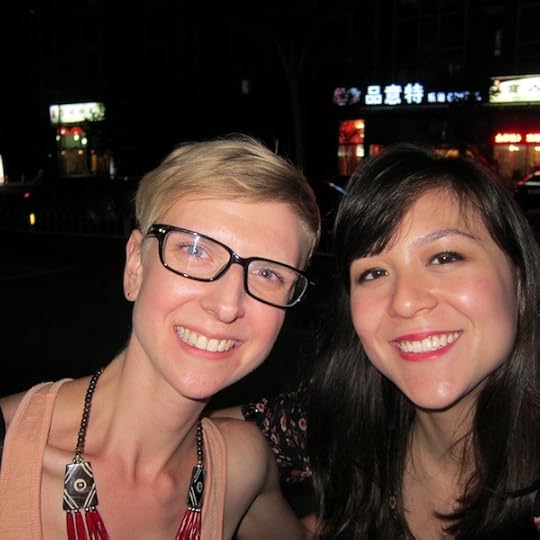
Imogen and me at her Beijing going away party
Do you regret moving to Beijing and not being like your friends who stayed in Melbourne?
Not at all. It was such a different, fun lifestyle in Beijing. The expats in Beijing are so bonded. They are your family. You celebrate Christmas with them and birthdays. Everything is with your friends.
You can call your friend at 5.45pm and say, “Meet me at this bar right now,” and they will. Now, in Melbourne, you call your friends and say that and they say, “I have to walk my dog. And then I have pilates. And I have a thing tomorrow. Do you think we could maybe get together in a week and a half?” It’s because in Melbourne, we’re all Australian so we don’t have to connect and latch onto each other so tightly.
But I get it. Now that I’ve moved back to Australia, I’m now the same way.
So how did you get into your current field, book publishing?
Do you remember another intern from the magazine, Abby? She ended up working in publicity for books at Penguin China. We would meet up for coffee and she’d tell me about her job promoting books and I thought, “I like books. That’s what I want to do!” I had this romantic notion about finding amazing authors and sharing them with the world. Getting more authors out there.
What happened to your love of writing?
I am way over writing. I am over it. I’ve done it. I’ve been bled. My writing became so formulaic at the magazine. And when I moved back to Melbourne, I was surrounded by writers. I saw all of these people in their 20s living off of noodles and crammed into share houses from hell and they had PhDs and couldn’t get jobs – but they were convinced they were going to be writers.
I didn’t love writing enough to live like that. That’s the whole reason why I left Beijing. I wanted to start living real life in the real world. I didn’t want to eat at Bimbos every single day so I could get a 4 dollar pizza. I wanted a real job with real heavy responsibilities and a clear career trajectory.
How did get back into the professional scene in Melbourne after having lived in China for five years?
Before I left Beijing, I started cold-calling a bunch of people who worked in the book industry in Melbourne. I’d call up and say, “You don’t know me but I’m very interested in hearing about your job and your experiences. I’d also love a job in book publicity. Is there any advice you can give me?”
It was absolutely mortifying. In Beijing, you can be crazy and people expect you to be crazy. In Melbourne, it throws people off when out of the blue someone calls you trying to get a job.
However, I’d totally recommend it to someone because it cuts through the shit. I know people who go to parties and then try to track down a certain person that they need to network with, but that can get muddled. I had zero connections and I had to start somewhere.
And you know what? For the most part, they were all really helpful. I’d get them to talk about their jobs and the book industry and then at the end of every conversation I’d ask, “Do you have a few names of other people I should contact?”
Afterwards, when I got to Melbourne, I followed up with everyone I spoke to and had a coffee with them. One of these coffee dates is the reason I was offered my dream job two years later.
When you landed in Melbourne, did you apply for jobs?
I did but I didn’t get any. I scheduled my return home so that it coincided with the Melbourne Writer’s Festival. I threw myself into it. I was very “eager beaver” about everything.
I began interning at a feminist press called SPINIFEX Press, because someone told me they are always looking for people. Then I also interned at Writers Victoria, an organization for writers that puts on events. I was also working at SPUNK, a network of independent publishers.
How was working in Melbourne different from working in China?
I had to learn the entire system from scratch. I didn’t mind it but at the same time, and I was applying for jobs and I wasn’t getting them. I was like, “I managed and edited my own magazine in China – and I can’t even get an interview?” It meant nothing to people.
It was a stressful time. I made almost no money and I was running around doing all these internships. But it was a point in my life where I knew I needed to push myself.
What do you mean by that?
Every point in my life where I‘ve really gone to the next level, I’ve always had to be completely humbled. When I didn’t get into my dream university, I had to build myself up again and work hard. And then when I moved to Beijing, I was back at square one and had nothing – no jobs, no language skills, no friends. I had to work hard to get anywhere. And then, five years later, it happened again when I moved back to Melbourne. It’s a pattern, but once I accepted that, I think it’s made me a better person.
How did you finally land a paying job?
I got a part-time job at the Melbourne Writer’s Festival and I also became the online editor at a literary magazine – the magazine paid nothing but it seemed to be something people were impressed by. I’d work all day and then come home and edit their blog.
After a year of this, I got promoted at the festival to a full-time position, but it was only for 8-9 months a year. I thought I was doing pretty well then. I had great friends, I loved my job, but I still wasn’t making the money I wanted or doing exactly what I wanted to do.
And then, completely out of the blue, one of the women that I had cold-called from Beijing and met for coffee, contacted me. It was an email asking me if I wanted to review a play for the literary magazine I edited, but then the next thing I knew she emailed me again saying, “My publishing company is looking for a senior publicist and a year ago, you said you wanted to work as a book publicist. Do you want to apply?”
Then what happened?
Honestly, my first reaction was to say no. They wanted three years of experience and I felt under-qualified. But I sent off a cover letter and a CV and thought nothing of it – just assumed I wouldn’t get it. The next day I got a call from the company, asking me to come in for an interview over coffee. And at the end of the coffee date, the woman turned to me and said, “We’d like to offer you the position.”
An offer for your dream job! Did you accept immediately?
No! I was terrified. I asked if I could have the weekend to think about it. I then convinced myself to turn it down: I had already booked and paid for a month-long trip to Europe and I wouldn’t be able to go if I took the job. Also, my other job at the festival was getting so busy so I felt like I couldn’t quit. And I did love that job, even we were drowning in work and only employed 9 months of the year. But mostly, I was terrified I wouldn’t be good as a book publicist.
And then I did a really embarrassing thing. I was so stressed out, so I made an objective pros and cons list. And that’s when I knew. There were 9 cons and 21 pros for taking the job. I called them on Monday and told them I’d take the job.
When someone comes to you out of the blue and hands you your dream job on a silver platter and wants you to start right away, you have to say yes. Don’t be stupid. Say yes.
And was it as scary and hard as you thought it would be?
Yes. It really was. It took four months to really figure everything out, and I’m still learning. It was really hard and scary. I had to learn how to call really famous people or renowned journalists and pitch them books. And the thing is, everyone at work was so nice and the hours were reasonable: I was just so scared of being bad at my job. I tried the “fake it till you make it” technique, but faking it is really exhausting.
But I’m really happy now. Now I kind of know what I’m doing. I know enough to know what’s a stupid question and what’s an okay question and when I can lean on people and when I cannot.
I have the lay of the land and have an important book coming up. I love the people and I love the books that we make, which I think is important. You don’t have to love all of the books but you have to love some of them.
And now that I have more of an understanding of what the job is, I love it even more than the idea of what I thought it was.
So what’s your advice to people trying to figure out their careers and lives?
I think in some respects, less advice is better. You’re starting out so young with so little of idea of what you want to do. If someone had come to me at that point and said, “My advice to you is XYZ,” well… that advice is always tainted and based on someone else’s experience that will never be your experience.
I really think you need to figure it out on your own and you need to reach that decision no matter how painful and traumatizing it is or how many times the world tears you down – that all eventually makes you a better person. If you had a terrible experience at a job, at least you now know what you don’t want.
Only when you hit rock bottom do you get the impetus to do something.
When you are broke and hate your job and hate your life, well, that’s when it becomes very clear what you need to do to change that.
Some people are okay with a mediocre life, as long as it pays the bills. That’s fine, but if you keep going that way, you’re never going to be challenged. You will never have been broke and living in a completely foreign land while working that unpaid internship for six months that eventually leads to you being the editor of your own magazine.
Do something and try not to be shit at it. No one wants that. Be enthusiastic and hard-working, no matter what you are doing.
The “Post Grad Dispatches” feature comes out every Wednesday. Stay posted.
Paris Vs. New York, Round 2
PARIS
Snow in Paris is rare, but when it happens, it’s magical. You get a light dusting; anything more than that, as this postcard probably implies (“Five centimeters and it’s panic”) and things shut down. Buses take forever to come, it’s slippery inside everywhere, and everyone declares that this is the “coldest winter Paris has ever seen” (hint: it’s ALWAYS the coldest winter Paris has ever seen, according to Parisians).
Pros of snow in Paris:
- Magical
- Looks like a snow globe
- Guaranteed conversation starter
- Good to kiss in because it’s not too heavy
- Will make you look like a halo-d snow angel when you come in from the cold
Cons:
- I have never seen a pair of snow boots for sale in Paris. Never.
- Nobody knows what to do with it so it just sits there
- Turns to slush almost immediately
- Slippier than snow in other places, for unknown reasons
- Your hair will be wet a lot
NEW YORK
Winter in New York guarantees you at least a few snow days. Unless you work, in which case, it guarantees you perhaps one snow day and about 4,234,344 of trudging through knee-deep snow and wearing wet jeans or trousers for the rest of the day.
Pros:
- Seeing kids sledding is awesome
- Lots of hot chocolate vendors to choose from
- A feeling of “we’re all in it together”
- Two words: Central Park
- A possible snow day
Cons:
- Workaholic bosses mean the rest of us still have to go in, despite the fact that there is six feet of snow blocking the door to your apartment building
- Wardrobe malfunctions, as per above
- The subway smells 10,000x stronger, as it has been made wet by the snow — and then heated.
- Hearing this question fifteen times a day: “Cold enough for you?”
- Trying to catch a cab in blizzard-like conditions
No matter where you are, snow is magical, quickly turning into terrible. If you had to choose, where would you rather be stranded: Paris or New York?
Sadly, we live in London, where it does not snow, but rains for days. Enjoy your current snow, New York City! Over the pond, we sit and stare at the rain and hope for the fairy-like snowfall promised to us by movies like Bridget Jones. But mostly, we wait in vain.*
*Although today it is sunny and bright, so London might actually win this round.
Graduates in Wonderland
We're Americans, but we write from London! Our daily blog has travel tips, career advice, British traditions investigated and much more nonsense -- welcome!
...more
- Jessica Pan's profile
- 545 followers


